To live a healthier life, I’ve found nine effective disease prevention strategies that really make a difference. Incorporating a whole-food, plant-based diet, staying active with regular exercise, and managing stress through mindfulness are essential. I also focus on staying informed about nutrition and embracing community support. Evaluating nutrient intake and advocating for my health when consulting with professionals are important steps too. If you’re curious about specific strategies and resources to enhance your well-being, there’s much more to explore.
Key Takeaways
- Adopt a whole-food, plant-based diet rich in fruits, vegetables, whole grains, and legumes to lower the risk of chronic diseases.
- Engage in regular physical activity, combining both aerobic and resistance training, to enhance overall fitness and reduce disease risk.
- Stay informed about nutrient deficiencies and prioritize essential vitamins and minerals for optimal health and disease prevention.
- Practice mindfulness and meditation to improve mental health and boost immune function as part of a healthy lifestyle.
- Advocate for your health by researching conditions and treatment options to make informed decisions in collaboration with healthcare professionals.
Disease Prevention and Treatment, 6 Edition
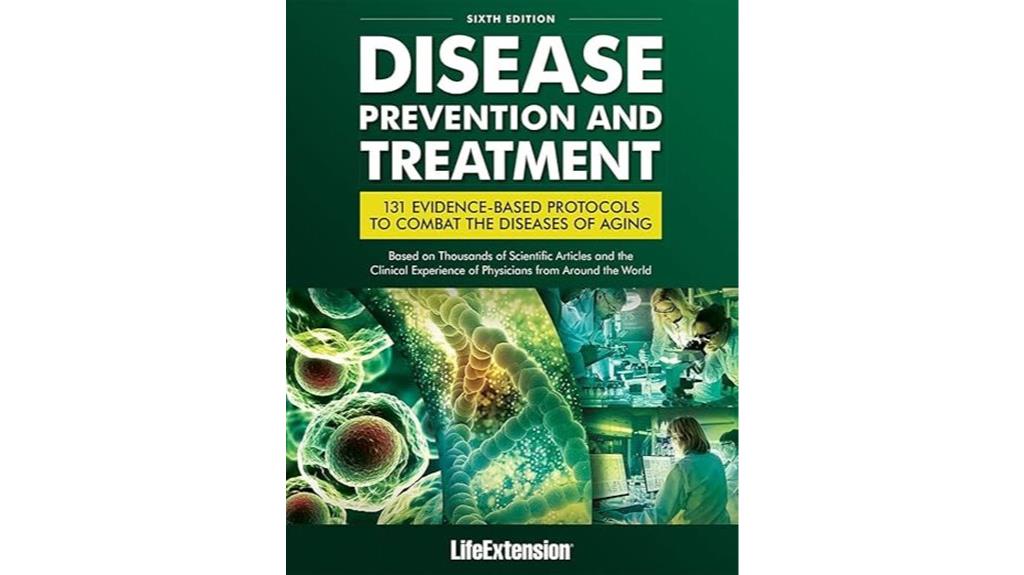
If you’re looking for an extensive guide to navigate the complexities of aging and disease management, the “Disease Prevention and Treatment, 6 Edition” is your best choice. This book bridges the gap between research and practical application, offering around 2,200 treatment suggestions for 130 major diseases. I appreciate how it presents conventional treatments alongside nutritional options, making it a valuable resource for anyone interested in alternative approaches. Readers rave about its clarity, and I’ve found it useful for discussions with my healthcare provider. While some topics could use more coverage, the insights offered are truly invaluable for personal health management.
Best For: Individuals seeking a comprehensive guide to disease prevention and treatment, particularly those interested in alternative health approaches during the aging process.
Pros:
- Provides around 2,200 treatment suggestions for 130 major diseases, bridging research and practical application.
- Presents conventional treatments alongside nutritional and supplement options, catering to those interested in alternative therapies.
- Easy to understand and useful for discussions with healthcare providers, enhancing personal health management.
Cons:
- Some readers note a lack of coverage on specific topics, such as nutritional ketosis for diabetics.
- Difficulties accessing referenced links may hinder the user experience.
- Perceptions that the new information in the latest edition is limited compared to previous versions.
HEALTHY LIFESTYLE FOR DISEASE PREVENTION
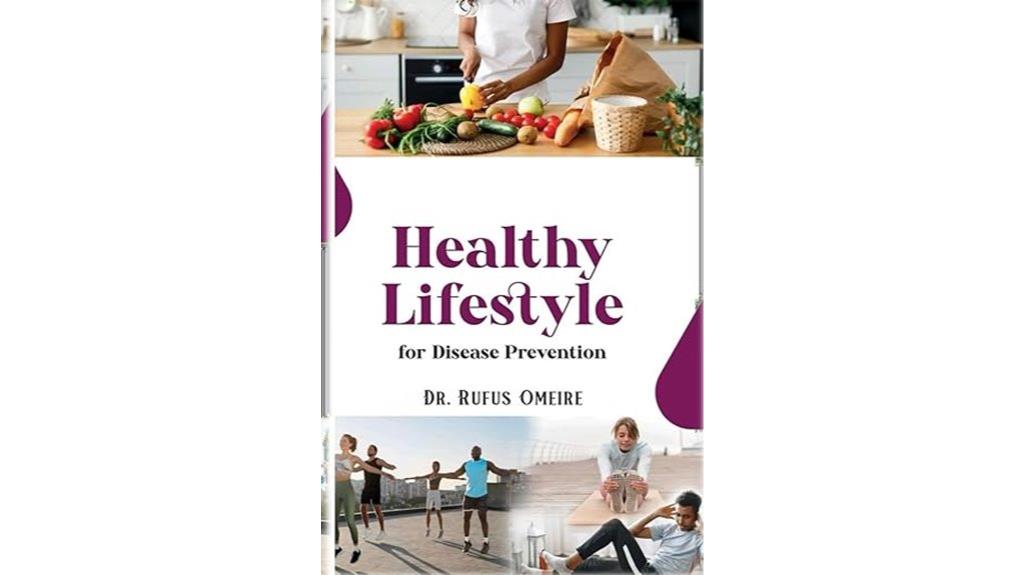
A healthy lifestyle is essential for anyone looking to prevent disease, and this book offers practical strategies that make it accessible for everyone, regardless of their starting point. I’ve found the straightforward advice invaluable in my journey towards healthier habits. The visual aids, especially the exercise demonstrations, make it easy to follow along and guarantee I’m doing them correctly. This book doesn’t just provide information; it motivates me to stick with my goals. I highly recommend it to anyone wanting to improve their health without feeling overwhelmed. It’s truly been a reliable guide in my pursuit of a healthier lifestyle.
Best For: Individuals seeking practical, straightforward advice for adopting a healthier lifestyle without feeling overwhelmed.
Pros:
- Provides clear and simple strategies for healthy living.
- Includes visual aids for easy exercise execution.
- Offers motivational support to help maintain health goals.
Cons:
- May not cover advanced dietary or fitness concepts in depth.
- Some readers might find the advice too basic if they are already knowledgeable about health.
- Limited focus on specific diseases or conditions that require tailored lifestyle changes.
The Miraculous Cure For and Prevention of All Diseases
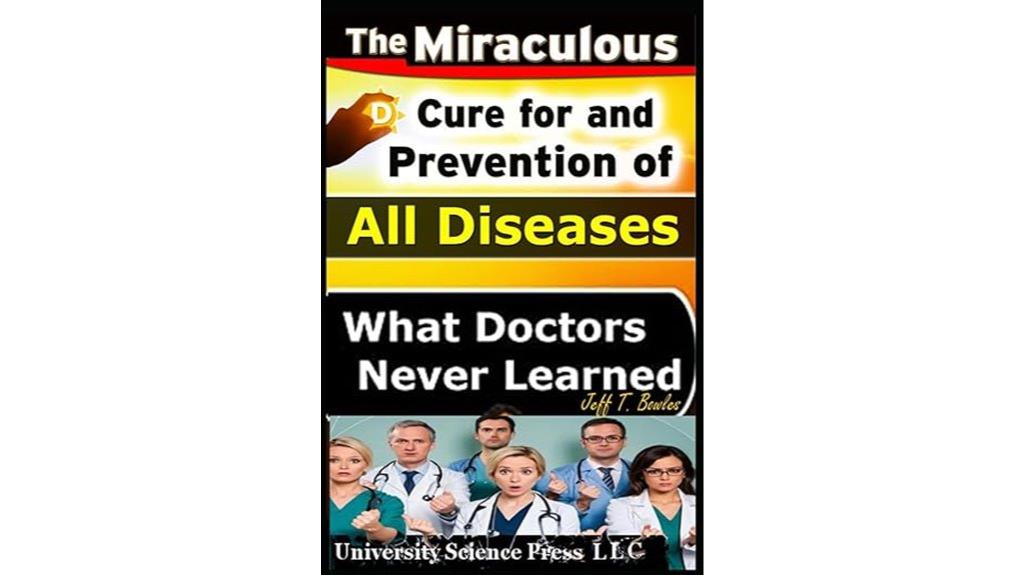
For those seeking to take charge of their health and explore alternative approaches to disease prevention, the book “Disease Prevention Strategies” offers invaluable insights. I’ve discovered that many health issues stem from overlooked nutrient deficiencies, particularly magnesium and essential vitamins like D and K2. The author, Jeff T. Bowles, encourages us to question mainstream medical advice, which often prioritizes profit over patient wellness. Readers share how implementing his recommendations has transformed their health. By focusing on nutrition and supplementation, I believe we can all achieve significant improvements in our well-being. This book is a must-read for anyone serious about health.
Best For: Individuals seeking to improve their health through alternative approaches and those interested in addressing nutrient deficiencies.
Pros:
- Well-researched content that provides valuable insights into nutrient deficiencies and their role in health.
- Empowering message encourages readers to take control of their health and question mainstream medical practices.
- Positive testimonials from readers who have experienced significant health improvements after implementing the book’s recommendations.
Cons:
- Skeptical stance towards mainstream medicine may alienate some readers who prefer traditional medical advice.
- Focus on nutrient deficiencies may not address all health issues, potentially leading to an incomplete understanding of certain conditions.
- Limited availability of printed data may require readers to seek additional information online, which could be inconvenient for some.
The Alzheimer’s Prevention & Treatment Diet
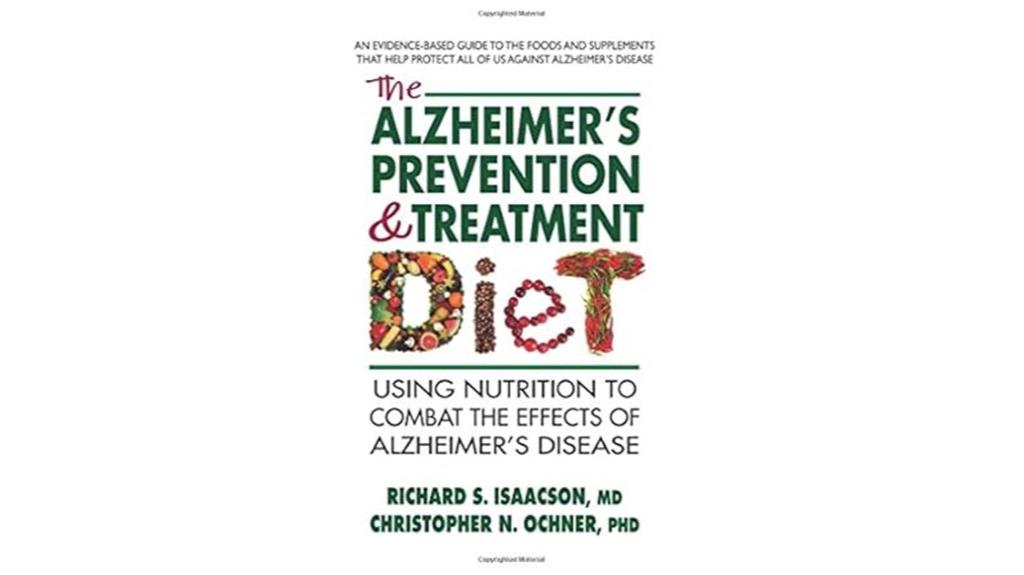
Concerned about Alzheimer’s and looking for effective prevention strategies? “The Alzheimer’s Prevention & Treatment Diet” offers a compelling approach, especially for those over 45 or with a family history of the disease. This well-researched diet emphasizes low carbs and high protein, guiding us to consume about 1 gram of protein per pound of body weight. It also highlights the importance of Omega-3s for brain health. The book provides practical menus and a gradual shift, making it easier to adopt. While some may find it restrictive, it’s a valuable resource for anyone serious about reducing their Alzheimer’s risk.
Best For: Individuals over 45 or those with a family history of Alzheimer’s seeking effective dietary strategies for prevention.
Pros:
- Comprehensive approach linking nutrition and brain health, supported by scientific evidence.
- Practical implementation with sample menus and a gradual transition to the diet.
- Positive feedback from readers with personal experiences highlighting its potential benefits.
Cons:
- Some may find the diet restrictive, especially regarding portion sizes of whole grains and legumes.
- Long-term adherence may be challenging for those with different caloric needs or demanding lifestyles.
- Mixed reviews on the novelty of the information presented, with some considering it not groundbreaking.
Disease Prevention and Treatment, 4th Edition
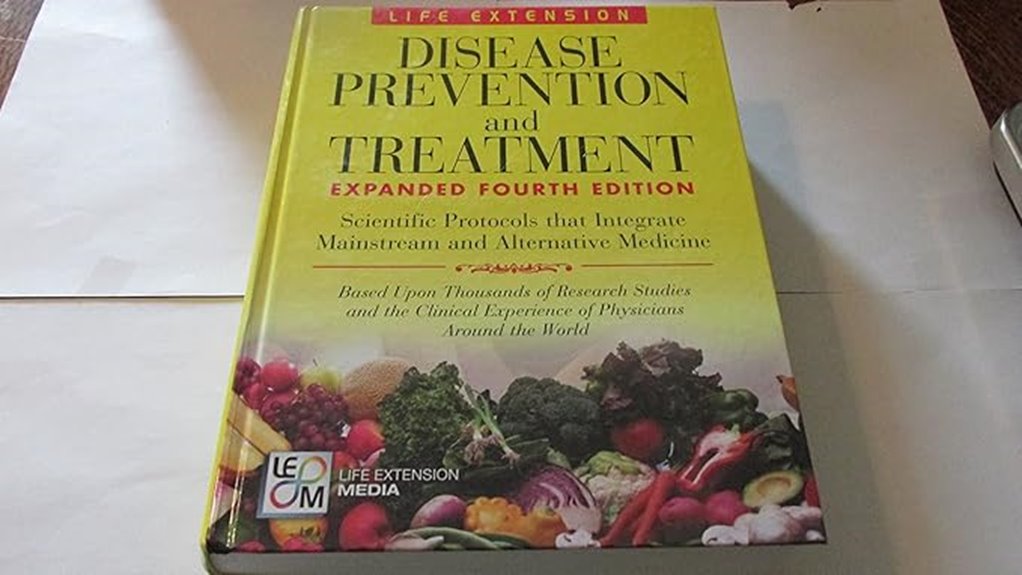
Individuals seeking to take control of their health will find “Disease Prevention and Treatment, 4th Edition” an invaluable resource. After facing my own health crisis, I discovered this thorough guide, which balances conventional and alternative treatments. It empowers readers to understand their options, offering well-researched protocols often overlooked. I personally benefited from its advice, reducing flu symptoms considerably without antibiotics. The book’s extensive coverage and practical suggestions make it accessible for everyone, whether you’re a novice or experienced in health discussions. I highly recommend it to anyone passionate about improving their health and advocating for themselves in medical settings.
Best For: Individuals seeking to empower themselves with knowledge about both conventional and alternative health treatments.
Pros:
- Offers a comprehensive guide covering a wide range of diseases and treatment options.
- Provides well-researched protocols and practical suggestions that are easy to understand.
- Encourages self-advocacy and informed discussions with healthcare professionals.
Cons:
- Lengthy at 1561 pages, which may be overwhelming for some readers.
- Focus on alternative treatments may not appeal to those strictly adhering to conventional medicine.
- Some information may be dated since the book was published in 2003, despite its relevance today.
Prevent And Reverse Heart Disease: Nutrition-Based Cure

If you’re looking to take control of your heart health, “Prevent And Reverse Heart Disease” by Dr. Caldwell B. Esselstyn Jr. is a game-changer. This book reveals how a plant-based diet can prevent and even reverse heart disease. After adopting this approach, I’ve lost weight and gained emotional stability, discovering the real power of nutrition. With over 150 delicious vegan recipes, I found satisfying alternatives to my old favorites. The scientific evidence supporting a diet low in sugar, oil, and salt is compelling, and I wholeheartedly recommend this resource for anyone serious about transforming their heart health.
Best For: Individuals seeking to improve their heart health through a plant-based diet and lifestyle changes.
Pros:
- Comprehensive Guidance: Offers in-depth scientific evidence and practical dietary guidelines for heart health.
- Delicious Recipes: Includes over 150 vegan recipes that provide satisfying alternatives to traditional meals and desserts.
- Transformative Impact: Many readers report significant health improvements and emotional stability after adopting the diet.
Cons:
- Requires Commitment: Transitioning to a plant-based diet may be challenging for those accustomed to meat and processed foods.
- Potential Initial Costs: Some may find the cost of fresh produce and specialty ingredients higher than their usual diet.
- Limited Appeal: The focus on a strict diet low in sugar, oil, and salt may not resonate with everyone or be suitable for all lifestyles.
How Not to Die: Foods to Prevent and Reverse Disease

For anyone seeking to take charge of their health and prevent chronic diseases, Dr. Michael Greger’s “How Not to Die” is a game-changer. It highlights how a whole-food, plant-based diet can prevent and even reverse serious health issues like heart disease and diabetes. By focusing on nutrient-rich foods—like beans, grains, and berries—I’ve learned to make informed choices that empower my health journey. Greger’s “Daily Dozen” checklist guarantees I include a variety of colorful foods each day, making meals enjoyable. This approach not only enhances well-being but also fosters a positive relationship with food—something we all deserve.
Best For: Individuals looking to improve their health and prevent chronic diseases through dietary changes.
Pros:
- Empowering Knowledge: Provides readers with evidence-based nutritional information to make informed dietary choices.
- Practical Guidelines: Introduces the “Daily Dozen” checklist, making it easy to incorporate a variety of nutrient-rich foods into daily meals.
- Positive Relationship with Food: Encourages enjoyment of meals and fosters a healthier mindset towards eating.
Cons:
- Potential Overwhelm: The emphasis on strict dietary guidelines may feel overwhelming for those new to plant-based eating.
- Limited Medical Focus: Critiques the current medical education system, which may leave some readers feeling unsupported in their health journey.
- Availability of Foods: Access to fresh, whole foods may be challenging for individuals in certain areas, limiting the practicality of recommendations.
Disease Prevention and Treatment: Scientific Protocols
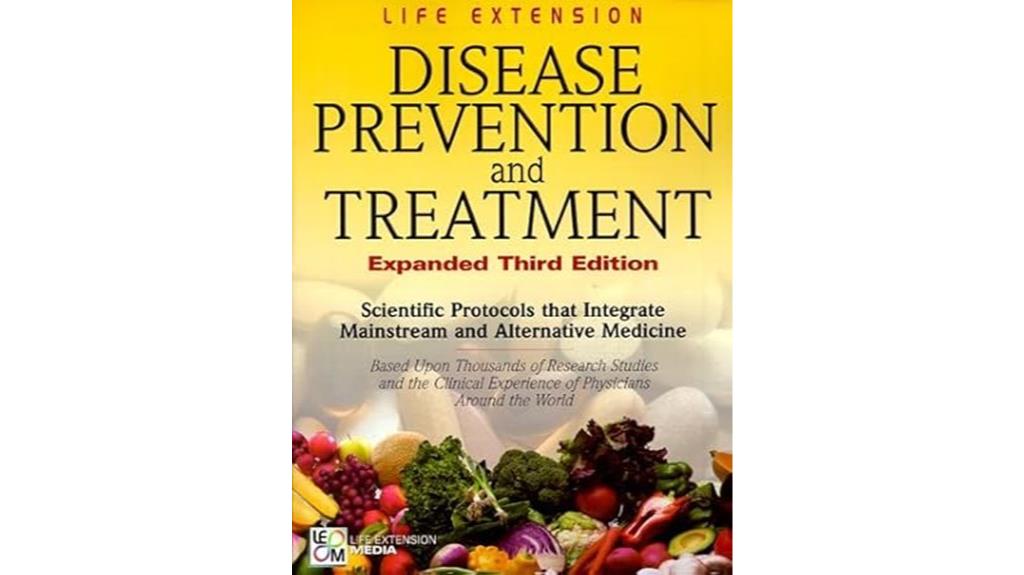
Those seeking a thorough resource on disease prevention and treatment will find “Disease Prevention and Treatment: Scientific Protocols” invaluable. This book extensively covers treatments for various illnesses, from common colds to cancer. I appreciate its scientific rigor and honesty, as the authors provide accurate assessments without false hopes. The foundation behind the book prioritizes research over profit, ensuring quality and integrity in their recommendations. By reading this, I gain insight into the future of medicine and empower myself to take proactive steps toward peak health. It’s an essential tool for anyone serious about enhancing their well-being and longevity.
Best For: Individuals seeking comprehensive, scientifically backed information on disease prevention and treatment options for various health conditions.
Pros:
- Comprehensive Coverage: Offers extensive information on treatments for a wide range of illnesses, from minor ailments to serious diseases.
- Scientific Rigor: Provides honest assessments with full references, ensuring credibility and enabling further exploration.
- Empowerment: Encourages proactive health management, equipping readers with knowledge to make informed decisions about their well-being.
Cons:
- Size and Complexity: The book’s extensive length may be overwhelming for some readers looking for quick solutions.
- Alternative Treatments: Some recommendations may fall outside traditional medical practices, which might not appeal to all healthcare providers.
- Independent Quality Control: Products discussed might require additional verification of quality, potentially complicating access for consumers.
The Prevent and Reverse Heart Disease Cookbook: Plant-Based Recipes
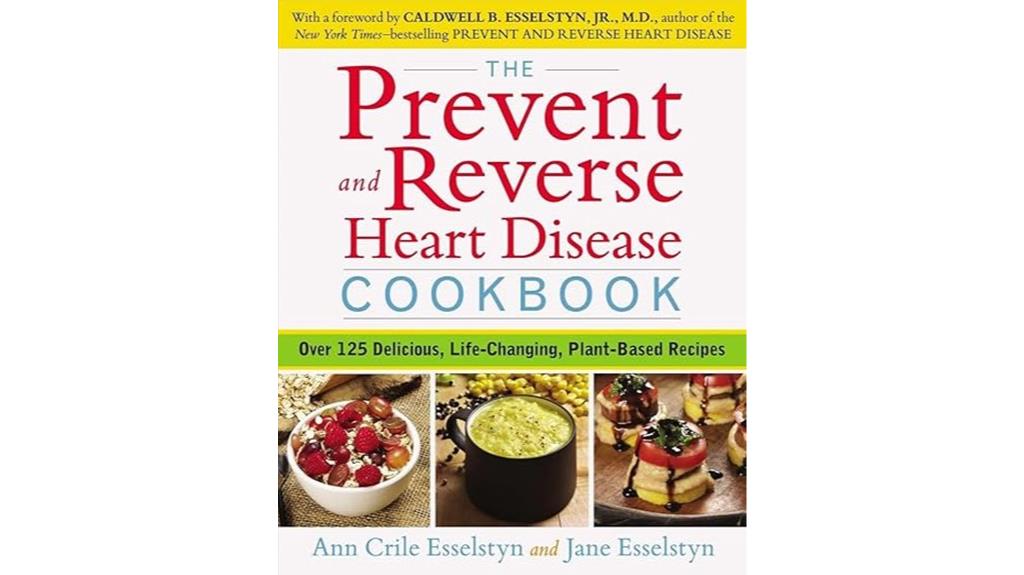
The Prevent and Reverse Heart Disease Cookbook is an ideal choice for anyone looking to enhance their heart health through delicious, plant-based meals. With over 125 easy-to-follow recipes and appealing photos, I found it accessible for everyone, not just those with heart issues. I particularly enjoyed the Red Lentil and Dill Soup and the best-ever hummus. Users, including myself, have experienced weight loss, increased energy, and better sleep. While some recipes might feel bland, adapting them to personal tastes can spice things up. Overall, this cookbook has truly transformed my approach to cooking and maintaining heart health.
Best For: Individuals looking to improve their heart health through delicious and accessible plant-based recipes.
Pros:
- Over 125 easy-to-follow plant-based recipes that cater to a variety of tastes and preferences.
- Positive health impacts reported by users, including weight loss, increased energy, and better sleep.
- User-friendly spiral-bound format and appealing photos make cooking enjoyable and accessible.
Cons:
- Some recipes may feel bland, requiring adaptation to personal taste preferences.
- Limited variety of full meal options, with a focus on sauces and condiments.
- Accessibility issues for certain ingredients depending on location, which may hinder recipe preparation.
Factors to Consider When Choosing Disease Prevention

When I think about choosing effective disease prevention strategies, I consider several key factors that can make a big difference. It’s important to be aware of nutrient deficiencies, explore dietary approaches, and understand the significance of lifestyle modifications. Plus, I always look for scientific evidence and alternative treatments to support my decisions.
Nutrient Deficiencies Awareness
How often do we consider the essential role of nutrient deficiencies in our overall health? I realize that many of us overlook this significant aspect. For example, magnesium deficiency often flies under the radar, and standard blood tests can miss it, leaving us unaware of its impact. Essential nutrients like Vitamins A, C, D, K2, Boron, Zinc, and B6 are important for preventing diseases, yet many of us don’t know if we’re deficient. This lack of awareness can seriously hinder our self-healing and overall wellness. By addressing these deficiencies through dietary changes or supplements, we might see improvements in health conditions that traditional treatments fail to resolve. It’s imperative to prioritize awareness and testing for effective disease prevention.
Dietary Approaches and Guidelines
While many people focus on specific diets, I believe it’s vital to contemplate a holistic approach to dietary guidelines for disease prevention. Emphasizing whole, plant-based foods is important; these foods provide essential nutrients while reducing processed items high in sugar and unhealthy fats. I’ve found scientific evidence supporting low carbohydrate, high protein diets can benefit brain health, especially in lowering Alzheimer’s risk. Following nutrition guidelines like the “Daily Dozen” helps me incorporate a variety of foods, such as beans, whole grains, fruits, and vegetables. Additionally, I prioritize specific nutrients like Omega-3 fatty acids and vitamins A, C, D, and K for improved health. Combining these dietary changes with exercise is key to preventing chronic diseases and promoting my long-term wellbeing.
Lifestyle Modifications Importance
Understanding the importance of lifestyle modifications in disease prevention is essential for anyone looking to improve their health. I’ve found that adopting a whole-food, plant-based diet can greatly lower my risk of chronic diseases like heart disease and diabetes. Regular physical activity, including cardio and strength training, not only keeps me fit but can also cut my risk of developing Alzheimer’s by up to 50%. Incorporating colorful fruits and vegetables into my meals enhances my overall well-being, providing essential nutrients and antioxidants. Maintaining a healthy weight through these changes prevents hypertension and high cholesterol. Finally, practicing mindfulness and meditation has improved my immune function, reminding me that mental health is just as vital in disease prevention.
Scientific Evidence Support
After exploring the significance of lifestyle modifications in disease prevention, it’s clear that scientific evidence plays an essential role in shaping our understanding of how these changes impact our health. Large-scale epidemiological studies reveal strong correlations between our lifestyle choices—like diet and exercise—and chronic diseases. Randomized controlled trials provide rigorous data on specific interventions, such as dietary adjustments or supplements, helping us see their effectiveness in reducing disease risk. Meta-analyses further strengthen our conclusions by compiling data from various studies. I often turn to peer-reviewed journals to find reliable information, as they guarantee rigorous evaluation by experts. Ultimately, guidelines from reputable health organizations synthesize this research, offering us proven recommendations for maintaining a balanced diet and staying active.
Alternative Treatments Exploration
As I explore alternative treatments for disease prevention, it is vital to take into account several factors that can impact their effectiveness. Nutrition plays a pivotal role; I’ve found that a whole-food, plant-based diet can greatly lower the risk of chronic diseases like heart disease and diabetes. Addressing nutrient deficiencies, particularly with magnesium and vitamins D and C, is essential for overall health. I’ve noticed that integrating both mainstream and alternative treatments creates a more holistic approach to wellness. Many personal stories reveal improvements in health outcomes—like weight loss and emotional stability—after lifestyle changes. Additionally, regular physical activity combined with these dietary practices further reduces the risk of diseases, benefiting both brain and cardiovascular health.
Personal Health Advocacy
Exploring alternative treatments has made me realize the importance of personal health advocacy in choosing effective disease prevention strategies. When I take charge of my health decisions, I often find improved outcomes. This means researching my health conditions, understanding my treatment options, and communicating openly with my healthcare providers. A proactive approach allows me to question conventional medical advice and explore alternatives that align with my values. Staying informed about the latest medical research empowers me to make educated choices. Additionally, building a supportive community with others who share similar health concerns has been invaluable. We encourage each other and share resources that enhance our personal health advocacy efforts, making the journey toward better health a collaborative experience.
Long-term Commitment Strategies
While committing to long-term disease prevention can feel challenging, I’ve found that establishing realistic health goals is vital for success. I focus on gradually integrating these goals into my daily life, which makes them sustainable. Regularly tracking my progress with a health journal or app keeps me motivated and accountable, allowing me to adjust my strategies as needed.
Creating a support system of family, friends, or health professionals has also been significant; their encouragement fosters a sense of community. Additionally, educating myself about health risks and benefits empowers me to make informed choices. Finally, I’ve learned that being flexible—allowing for occasional indulgences while prioritizing my health—prevents feelings of deprivation and helps me stick to my prevention-focused lifestyle.
Frequently Asked Questions
How Does Stress Affect Disease Prevention Strategies?
Stress really impacts how I approach disease prevention. When I’m stressed, my immune system weakens, making me more susceptible to illnesses. I’ve noticed that stress often leads me to unhealthy habits, like overeating or skipping exercise. It’s tough to stick to my healthy routines when I’m overwhelmed. To combat this, I’ve started practicing mindfulness and finding time to relax, which helps me stay focused on my health goals and overall well-being.
What Role Does Sleep Play in Disease Prevention?
I’ve found that sleep plays a vital role in disease prevention. When I get enough rest, my body can repair itself, regulate hormones, and strengthen my immune system. I’ve noticed that lack of sleep makes me more susceptible to illnesses. Prioritizing quality sleep has helped me maintain my overall health and well-being. So, if I want to stay healthy, I make sure to get those solid hours of sleep each night.
Can Social Connections Impact Disease Prevention Efforts?
When I think about social connections, I picture a garden. Each friendship is a flower, thriving together. I’ve noticed that my relationships have a huge impact on my health. Research shows strong social ties can lower stress and boost immunity, making disease prevention more effective. Just like a garden flourishes with care, our well-being blossoms with supportive connections. So, let’s nurture those bonds—it’s a simple way to enhance our health!
How Important Is Hydration for Overall Health?
Hydration’s essential for my overall health. I’ve noticed that when I drink enough water, I feel more energetic and focused. It helps my body function properly, supports digestion, and keeps my skin looking great. I’ve learned that even mild dehydration can affect my mood and performance, so I always keep a water bottle nearby. Making hydration a priority has definitely improved my well-being, and I encourage you to do the same!
Are There Any Specific Supplements Recommended for Disease Prevention?
Imagine standing in a vibrant garden, surrounded by the colors of health. I often think about supplements like vitamin D, omega-3 fatty acids, and probiotics when considering disease prevention. These little powerhouses can boost my immune system and support my overall well-being. However, I always consult my healthcare provider before adding anything to my routine. They help me navigate the maze of options, ensuring I choose what’s best for my health.
Conclusion
In my journey toward a healthier life, I’ve embraced vibrant foods, active living, and mindful choices. I’ve learned that prevention isn’t just about avoiding illness—it’s about cultivating wellness, nurturing resilience, and fostering a thriving spirit. By prioritizing balanced nutrition, staying active, and managing stress, I’ve built a foundation for a brighter future. So let’s commit to this shared path of health, empower ourselves through knowledge, and celebrate every small victory on our journey to prevention and liveliness.









